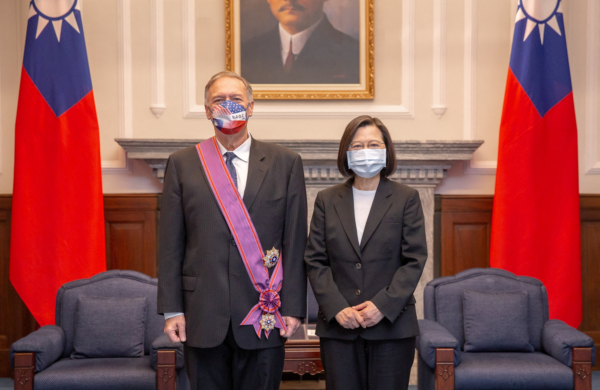 Taiwan's President Tsai Ing-wen poses for pictures with Former US Secretary of State Mike Pompeo after he was bestowed with an Order of Brilliant Star with Grand Cordon at the presidential building in Taipei, Taiwan, 3 March 2022;
Credit: Taiwan Presidential Office / Reuters
Taiwan's President Tsai Ing-wen poses for pictures with Former US Secretary of State Mike Pompeo after he was bestowed with an Order of Brilliant Star with Grand Cordon at the presidential building in Taipei, Taiwan, 3 March 2022;
Credit: Taiwan Presidential Office / Reuters
TAIPEI (Reuters) - Taiwan President Tsai Ing-wen bestowed a presidential honour on former US Secretary of State Mike Pompeo on Thursday 3 March 2022 for his contribution to boosting relations with the island, as China's top newspaper lambasted him again as a "liar".
China placed sanctions on Mr Pompeo when he left office at the end of the Trump presidency last year, angered by his repeated criticism of the country, especially its ruling Communist Party, and support for Chinese-claimed Taiwan.
Meeting Mr Pompeo at the presidential office in Taipei, President Tsai thanked him for his long-time support of Taiwan.
"A visit from such a good friend as Secretary Pompeo attests to the strong Taiwan-US friendship," she said.
President Tsai bestowed on him the Order of the Brilliant Star with Grand Cordon, one of Taiwan's top honours. Former US Secretary of Defense Donald Rumsfeld is another previous honouree.
Mr Pompeo, wearing a face mask with US and Taiwanese flags emblazoned upon it, said he was proud of his achievements while in office to try and normalise relations with Taiwan, including sending US officials to visit.
"It is not provocative to say that one demands freedom. Indeed to walk away from these things demonstrate the absence of resolve," he said.
China put sanctions on "lying and cheating" Pompeo and 27 other top Trump-era officials as President Joe Biden took office in January 2021.
China's top newspaper, the party's official People's Daily, called Mr Pompeo in a commentary on Thursday an "extremely notorious" anti-China politician who "took pride in lying and deceit" while in office.
"Collusion with external forces cannot bring security or well-being for the Taiwanese people," it said of his trip.
The Donald Trump administration gave strong backing to Taiwan, despite the lack of formal diplomatic ties, including high-profile arms sales and visits by top US officials to Taipei. China has stepped up its military and diplomatic pressure against Taiwan over the past two years, seeking to force the island to accept its sovereignty. Taiwan's democratically-elected government says it wants peace but will defend itself if attacked, and that only the island's people have the right to decide their future.








